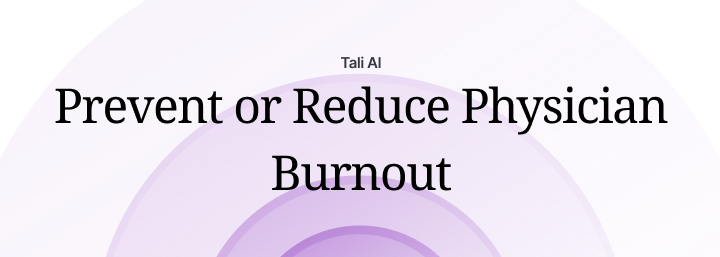Physician Burnout Symptoms: How to Recognize and Prevent Them
Table of Contents
Are you feeling stressed, exhausted, or overwhelmed by your work as a physician? Do you find it hard to enjoy your personal life or hobbies? Do you feel detached, cynical, or indifferent towards your patients or colleagues? If you answered yes to any of these questions, you might be suffering from physician burnout.
Physician burnout is a serious problem that affects many doctors. It is a state of emotional, physical, and mental exhaustion caused by chronic stress and dissatisfaction in the workplace. It can lead to reduced quality of care, increased medical errors, lower patient satisfaction, higher turnover rates, and increased risk of substance abuse, depression, and suicide among physicians.
As physician burnout statistics show, this issue has become a hidden epidemic within the medical profession, with burnout rates increasing from 45.5% in 2011 to 62.8% in 2021-2022. The consequences of physician burnout can be significant for practitioners and patients, leading to increased errors, lower patient satisfaction scores, and even causing some physicians to leave the profession entirely. Addressing this pressing concern is crucial for the well-being of healthcare providers and the quality of care they deliver.
But how can you tell if you or your colleagues are experiencing burnout? What are the signs and symptoms that indicate a need for intervention and support? And what can you do to prevent or reduce burnout and improve your well-being and performance?
In this blog post, we will answer these questions and provide some practical tips and resources to help you cope with burnout and enhance your professional fulfillment. We will also introduce you to Tali, an AI-powered medical dictation and ambient scribe tool that can help you save time and reduce stress on documentation and administrative tasks.
What Are The Signs And Symptoms Of Physician Burnout?

Burnout does not happen overnight. It is usually the result of prolonged exposure to stressful work conditions that overwhelm your coping resources and erode your sense of meaning and purpose in your work. Therefore, it is important to recognize the signs and symptoms of burnout before they escalate into more severe consequences.
Some of the signs and symptoms of physician burnout include:
Increased cynicism, negativity, and detachment from your work and patients
Trouble sleeping, falling asleep, or staying asleep
Becoming overwhelmed or easily irritated by minor problems or challenges
Dreading or missing work, or feeling like you have no control over your schedule or workload
Losing interest or enjoyment in activities that used to bring you pleasure or satisfaction
Feeling guilty or inadequate about your performance or quality of care
If you notice any of these signs in yourself or your colleagues, it is time to take action and seek help. Ignoring or denying these signs can lead to more serious problems down the road.
| Early Sign | Description |
|---|---|
Cynicism | Feeling negative, pessimistic, or indifferent about your work and patients |
Insomnia | Having difficulty falling asleep, staying asleep, or getting enough quality sleep |
Overwhelm | Feeling stressed, anxious, or frustrated by minor or routine challenges |
Dread | Feeling reluctant, fearful, or hopeless about going to work or facing your responsibilities |
Anhedonia | Losing interest, joy, or motivation in activities that used to be rewarding or fulfilling |
Guilt | Feeling inadequate, incompetent, or responsible for poor outcomes or mistakes |
How Does Physical Fatigue Show In Burnout?
One of the most common and noticeable symptoms of physician burnout is physical fatigue. Fatigue is more than just feeling tired or sleepy. It is a state of reduced energy, stamina, and alertness that impairs your ability to function effectively and safely.
Physical fatigue can manifest in various ways, such as:
Feeling exhausted or drained most of the time
Having difficulty concentrating, remembering, or making decisions
Making more errors or having more near-misses
Having slower reaction times or reduced coordination
Having frequent headaches, back pain, muscle aches, or other physical complaints
Getting sick more often or having a weakened immune system
Physical fatigue can be caused by several factors, such as:
Long working hours or irregular shifts
Lack of breaks or rest periods
High workload or demand
Poor sleep quality or quantity
Lack of physical activity or exercise
Poor nutrition or hydration
Substance use or abuse
To prevent or reduce physical fatigue, it is essential to take care of your basic needs and adopt healthy habits. Some of the strategies that can help you combat fatigue include:
Setting realistic and reasonable goals and expectations for yourself and others
Prioritizing and delegating tasks that are not essential or urgent
Taking regular breaks throughout the day to recharge and relax
Getting enough sleep (at least 7 hours per night) and following a consistent sleep schedule
Engaging in physical activity (at least 30 minutes per day) that suits your preferences and abilities
Eating a balanced diet that provides adequate energy and nutrients
Drinking enough water (at least 8 glasses per day) to stay hydrated
Avoiding excessive caffeine, alcohol, nicotine, or other stimulants or depressants.What emotional symptoms signal burnout?
Another major symptom of physician burnout is emotional exhaustion. Emotional exhaustion is a state of feeling emotionally drained, depleted, or overwhelmed by your work. It can lead to a loss of empathy, compassion, and connection with your patients and colleagues.
Emotional exhaustion can manifest in various ways, such as:
Feeling depressed, hopeless, or worthless
Feeling angry, irritable, or resentful
Feeling anxious, nervous, or fearful
Feeling detached, isolated, or lonely
Feeling numb, indifferent, or apathetic
Feeling helpless, powerless, or trapped
Emotional exhaustion can be caused by several factors, such as:
Lack of autonomy or control over your work environment or decisions
Lack of recognition or appreciation for your work or achievements
Lack of support or feedback from your supervisors, peers, or staff
Lack of alignment or congruence between your values and goals and those of your organization or profession
Lack of meaning or purpose in your work or role
Exposure to trauma, suffering, or death
To prevent or reduce emotional exhaustion, it is vital to nurture your emotional well-being and seek professional help if needed. Some of the strategies that can help you cope with emotional exhaustion include:
Identifying and expressing your emotions in healthy and constructive ways
Seeking and accepting support from your family, friends, mentors, or colleagues
Seeking and providing recognition and appreciation for yourself and others
Seeking and creating opportunities for autonomy, control, and decision-making in your work
Seeking and finding meaning and purpose in your work and role
Seeking and engaging in activities that align with your values and goals
Seeking and utilizing resources for trauma-informed care and self-care
Do memory issues relate to burnout?
Another symptom of physician burnout that can affect your cognitive functioning is memory impairment. Memory impairment is a state of having difficulty remembering information, events, or tasks that are relevant to your work. It can lead to poor performance, reduced efficiency, increased stress, and decreased confidence.
Memory impairment can manifest in various ways, such as:
Forgetting names, dates, details, or instructions
Forgetting appointments, meetings, deadlines, or obligations
Forgetting to complete tasks or follow up on actions
Forgetting to document or chart patient information
Forgetting to prescribe medications or order tests
Memory impairment can be caused by several factors, such as:
Information overload or multitasking
Distraction or interruption
Fatigue or sleep deprivation
Stress or anxiety
Depression or mood disorders
Medication side effects
To prevent or reduce memory impairment, it is important to enhance your cognitive functioning and seek medical attention if needed. Some of the strategies that can help you improve your memory include:
Organizing and simplifying information using lists, calendars, reminders, notes, or apps
Focusing and concentrating on one task at a time and minimizing distractions or interruptions
Repeating and reviewing information using verbalization, visualization, association, or mnemonics
Testing and applying information using quizzes, practice questions, case studies, or simulations
Resting and refreshing your mind using breaks, meditation, relaxation techniques, or hobbies
Treating any underlying medical conditions that may affect your memory using medication, therapy, or counselingCan empathy decrease due to burnout?
Another symptom of physician burnout that can affect your interpersonal relationships is empathy decline. Empathy decline is a state of having reduced ability or willingness to understand and share the feelings of others. It can lead to impaired communication, decreased patient satisfaction, increased conflict, and diminished trust.

Empathy decline can manifest in various ways, such as:
Being indifferent, insensitive, or dismissive of the emotions, needs, or concerns of others
Being impatient, rude, or hostile towards others
Being defensive, blaming, or critical of others
Being isolated, withdrawn, or avoidant of others
Being burned out, bored, or disengaged from others
Empathy decline can be caused by several factors, such as:
Compassion fatigue or emotional overload
Moral distress or ethical dilemmas
Role conflict or role ambiguity
Lack of feedback or validation
Lack of diversity or inclusion
Lack of training or education
To prevent or reduce empathy decline, it is crucial to cultivate your emotional intelligence and seek social support if needed. Some of the strategies that can help you enhance your empathy include:
Practicing active listening and reflective feedback with your patients and colleagues
Expressing gratitude and appreciation for your patients and colleagues
Seeking and providing constructive feedback and validation for your patients and colleagues
Seeking and resolving any moral distress or ethical dilemmas with your supervisors or mentors
Seeking and clarifying any role conflict or role ambiguity with your supervisors or peers
Seeking and embracing diversity and inclusion in your workplace and profession
Seeking and participating in training or education on empathy skills and techniquesHow to prevent or reduce physician burnout with Tali
Conclusion
In this blog post, we have discussed some of the common symptoms of physician burnout and how to recognize and prevent them. We have also provided some practical tips and strategies to help you cope with burnout and improve your well-being and performance.
However, we also understand that sometimes, no matter how hard you try, burnout can be inevitable and overwhelming. That is why we want to introduce you to Tali, an AI medical dictation and ambient scribe tool that can help you reduce your documentation and administrative burden and save you time and stress.
Tali is a smart and innovative tool that can automatically transcribe your patient encounters, generate accurate and comprehensive clinical notes, and integrate seamlessly with your Electronic Health Record (EHR) system. Tali can also help you improve your patient communication, satisfaction, and outcomes by allowing you to focus more on your patients and less on your paperwork.
Tali is designed to help you prevent or reduce physician burnout by:
Reducing your workload and increasing your efficiency
Reducing your errors and improving your quality of care
Reducing your stress and improving your mood
Reducing your fatigue and improving your energy
With Tali, you can focus on your patients and let the AI do the rest. You can sign up for a free trial and see how Tali can make your life easier.
Documentation and Administrative Tasks?